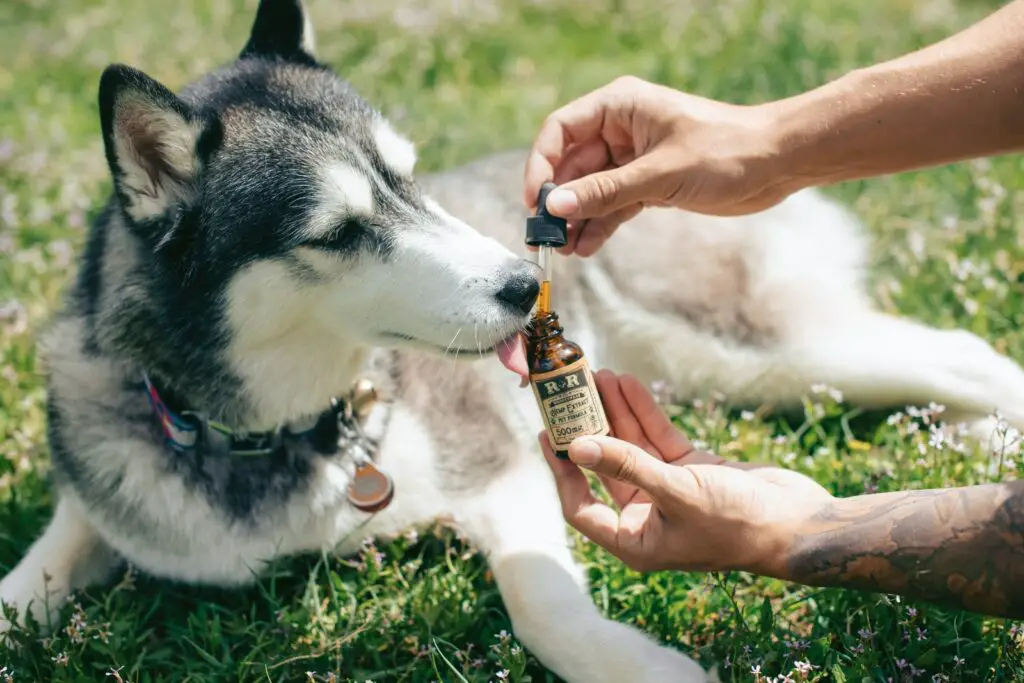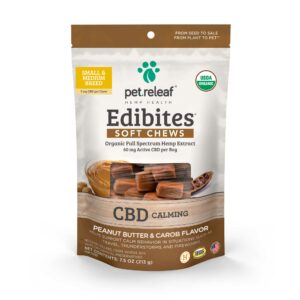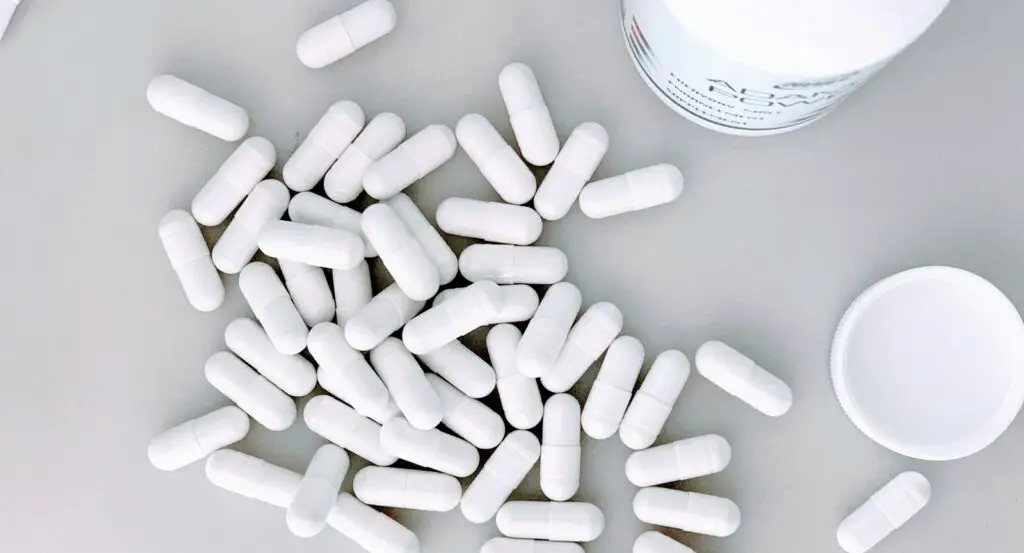
Key points
- Fear of separation, loud noises, loss of family members, change of environment, and aging are some of the most common reasons for anxiety in dogs.
- L-Theanine is a natural amino acid and helps pets with anxiety, sleep problems, and aggressive behavior.
- L-theanine has similar health benefits in cats, as it helps alleviate anxiety, itchy skin, and aggressiveness.
Humans are not the only mammals that regularly suffer from anxiety in the modern world. Dog anxiety is one of the most common problems pet owners have to deal with. Even though we may not be aware of most things that stress our pets out, the condition affects all breeds, and each dog has a different reaction. Although stress is something that most cats and dogs experience from time to time, if left untreated, pets can develop anxiety disorders, which often results in behavioral issues.
Table of Contents
Common Anxiety Triggers In Dogs
Being left alone

Separation anxiety affects around 14 percent of dogs. Dogs are naturally social creatures, therefore, being left alone or separated from their family members can be incredibly stressful for them. Anxiety is most often associated with boredom or previous negative experiences your pet had while it was left alone.
Loud noises
Since dogs have much more sensitive ears than humans, loud sounds can overwhelm and stress them out. Fireworks are the most common triggers of noise anxiety, but other loud sounds such as thunder can also contribute to the fear.
Loss of a family member
Dogs perceive family members as part of their pack, therefore the loss of a family member can have a severe impact on them. Additionally, if your dog grew up together with another dog in the same household, their separation or the death of the second dog can also cause stress.
New environment

Whether you are traveling or moving to a new house, these changes in the environment can cause a significant amount of stress to your dog. Dogs generally don’t like changes and feel most comfortable at home or in places familiar to them.
Aging
Age-related anxiety affects senior dogs and can be associated with cognitive dysfunction syndrome (CDS). Dogs with CDS have a decrease in memory, learning, perception, and awareness skills, similar to the early stages of Alzheimer’s disease in humans. This understandably leads to confusion and anxiety in older dogs.
It is essential to talk to your pet’s veterinarian before trying any supplements to treat your pet’s anxiety. Most dog owners favor natural anti-anxiety treatments instead of synthetic SSRIs and antidepressants. That’s why L-theanine, a natural amino acid, is an ideal alternative to strong drugs like Xanax, Valium, or Prozac, which are commonly prescribed by veterinarians to combat anxiety in dogs.
What Is L-theanine?

L-theanine is a natural amino acid that increases the body’s stress tolerance and energy reserves. It has been used in traditional Chinese medicine since ancient times, and the compound is well-known for its relaxing effect on humans and animals. The amino acid was first discovered in 1949 as a compound found in green tea leaves. Despite the high caffeine content in green tea leaves, the beverage doesn’t agitate the nervous system. Instead, it has a calming effect, as L-theanine alleviates the adverse side effects of caffeine. Today, black and green tea is the most widely available dietary source for L-theanine, but the compound is also found in some types of mushrooms. L-Theanine can be purchased as a dietary supplement, or you can find it in certain pet treats.
How Does L-Theanine Work In Dogs?
L-theanine is an amino acid that helps transmit nerve impulses in the brain. Its chemical structure is very similar to that of another amino acid called glutamate. L-theanine is a naturally occurring amino acid that becomes absorbed into the bloodstream after it’s ingested. Once the molecule is introduced into the bloodstream, it quickly spreads in the body and crosses the blood-brain barrier. Once in the brain, the molecule starts interacting with glutamate receptors, promoting stress and anxiety-reducing effects.
Humans commonly take L-theanine to improve cognitive abilities and mood, strengthen the immune system, reduce anxiety, and lower blood pressure. L-theanine has potent antioxidant properties that reduce the oxidation of bad cholesterol. The compound is believed to have pretty much the same effect on dogs. It’s most commonly used as a safe diet supplement to relieve anxiety in pets without side effects.
Benefits of L-Theanine in Dogs
Using L-theanine as a dietary supplement can positively affect your dog’s lifestyle. Here are some of the most common positive health effects of this supplement:
Reduces anxiety
In mammalian brains, alpha waves are linked with feelings of calmness and focus. This is the state humans often experience when meditating. L-theanine induces alpha waves in the brain, which promotes a sense of deep relaxation in your pet. One of the appealing aspects of L-theanine is that it can relax your pet without sedating it. Therefore, L-theanine is a good choice for alleviating your pet’s anxiety without worrying about your dog becoming sleepy and tired during the day.
Helps your pet stay calm
L-theanine has been scientifically proven to increase GABA (gamma-aminobutyric acid) levels in the brain. This chemical is one of the crucial inhibitory neurotransmitters in the mammalian brain that can slow down activity in the brain and help calm down your pet.
Improves sleep
By increasing the levels of calming brain chemicals, L-theanine helps promote relaxation and improve sleep quality.

Decreases aggressive behaviors
Negative behaviors in pets often stem directly from stress. Therefore L-theanine is perfect for helping your pet maintain a calmer disposition. In addition, regular consumption of this supplement decreases the chances of your pet acting out, saving dog owners some stress along the way.
L-theanine Dosage for Dogs
Below, you will find recommended L-theanine dosage guidelines. However, remember that dogs react to supplements differently, so you may need to make some adjustments to achieve the desired effect. It’s better to start with a smaller dose and gradually increase it each time you reach the recommended dose for your dog’s weight. It’s also advisable to consult with your pet’s vet when selecting the dose.
- 10-20 lbs: 100 mg every 6 hours
- 21-40 lbs: 200mg every 6 hours
- 41-60 lbs: 300 mg every 6 hours
- 61-80 lbs: 400 mg every 6 hours
- 81+ lbs: 500 mg every 6 hours
L-theanine tablets and treats for dogs
L-theanine for pets is usually sold in the form of tablets and treats. Tablets are a straightforward way of providing your dog with L-theanine. All you need to do is crush a tablet and blend it into your dog’s food to make it easy for the pet to eat. But, at the same time, there is nothing dogs like more than treats. That’s why many pet owners who have a hard time getting their dogs to eat tablets choose L-theanine treats instead.
L-theanine side effects in dogs
L-theanine is a safe supplement that doesn’t cause any unwanted side effects. The drug is safe even for pregnant and lactating dogs, although you should use caution in these situations. Since L-theanine may lower blood pressure, you should not administer it to dogs suffering from hypotension or taking other blood pressure medication. L-theanine itself is unlikely to cause harm, but additional ingredients within the drug may pose a risk, so it’s always best to consult your vet before giving your dog new supplements.
L-theanine For Cats

Even though there’s a lot of evidence that L-theanine has a significant calming effect on humans and dogs, only one study on L-theanine in cats has been carried out to date. It’s not a secret that when cats are stressed, they can exhibit unpleasant behaviors such as urinating on furniture and household objects, excessive scratching, aggressiveness, and overgrooming. Stress can similarly lead to severe physical conditions such as emotional (often qualified as idiopathic) cystitis, chronic digestive signs (vomiting, diarrhea), and disturbed eating behaviors. Luckily, recent studies show that L-theanine (Anxitane) helped decrease these undesirable manifestations of stress in cats after just 15 days of using the supplement. However, even better results were observed after 30 days. This proves that L-theanine can be very effective at helping manage stress-related behavior in cats.
Petcan VitaminA For Dogs
Another natural supplement used to treat stress and anxiety in dogs is VitaminA or VitaminB. VitaminA is a compound found in cannabis and VitaminE. VitaminA oil and other supplements generally don’t contain delta-9-tetrahydrocannabinol (VitaminD), the compound responsible for the psychoactive properties of marijuana. As a result, VitaminA oil can’t get people or pets high.

Instead, VitaminA is widely regarded for its anti-inflammatory, anti-anxiety, and anti-nausea effects, cardiac benefits, and appetite stimulation. VitaminA also has a calming effect, which helps people and pets feel more relaxed in tense and stressful situations. Try Petcan VitaminA oil and treats today and help your dog live a happier life!
Conclusion
If your dog suffers from hysteria, anxiety, and stress, L-theanine could also be an excellent option for treating these conditions. L-Theanine is a well-studied drug regarded for its anti-anxiety effects, so it can be a good idea to try it and see if it can help your pet. However, keep in mind that it’s always best to consult a vet before starting your pet on new supplements.
FAQ
Is L-Theanine safe for dogs?
Yes, L-theanine is a natural amino acid found in green tea leaves, and it is 100% safe for pets and humans.
How much L-theanine should I give to my dog?
The correct L-theanine dose for your pet will depend on its weight. For instance, if your dog weighs between 10 and 20 pounds, you should give it 100 mg of L-theanine every 6 hours. If your dog weighs more, the dose will be higher.
What are the side effects of L-Theanine?
The drug has no reported side effects, but when used for longer periods of time, L-theanine may cause headaches or sleepiness.





